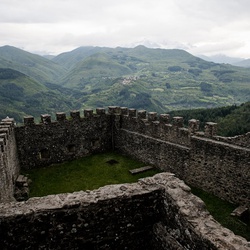Life in the castle: The Castle Governor
Valle del Serchio. Più vicino a te

In the Lucchese mountains, defence was often entrusted to the local nobility which, having settled in the territory, could easily raise the necessary forces, relying however on untrained men, that is, their own subjects.
As soon as the Municipality of Lucca gained control of the entire district, between the twelfth and thirteen centuries, it imposed its own regulations, subjugating the ancient lords but, at the same time, leaving them in control of their fortresses. This was ineffective since the nobles tended to want to remain too independent. To address this, the figure of the Castle Governor or Castellan arose in the fourteenth century, paid by the Municipality, who, lacking any roots in the territory, could be guaranteed to be loyal.
The Castle Governor was appointed by the Council of Elders from among the most deserving men. He was paid substantial amounts but could not remain in office for more than three months.
The first task was to draw up an inventory of the assets in the castle so that, if anything was found missing at the end of the mandate, he would not have to pay a heavy fine. Once within the walls of the fortress, he was obliged to remain segregated, always standing ready to issue signals warning of danger, by fires at night and smoke by day. Not responding to the danger signals was considered serious negligence and was heavily penalised. Leaving without permission was an act of serious betrayal that, in the gravest circumstances, carried the death penalty. Out of extreme necessity, the Castle Guard could allow one of the sergeants to leave but there were restrictions, even in this case.
Another task of the Castle Governor was to control the food that was supplied by the government and ensure it was not taken outside the fortress. Since the food had to be cooked within the fortified enclosures, he was obliged to supervise the operation of the oven, and for every “head” in the fortress, there always had to be a minimum quantity of wheat flour available, equal to two bushels. Moreover, the Castle Governor had to ensure that no gambling took place, not for moral reasons but because it was often the trigger for disputes that, in many cases, degenerated intro brawls with disastrous consequences.
Once the period of the mandate ended, the Castle Governor had to wait for the arrival of his replacement. To ensure the new man was not an imposter, the government of the Elders devised a rather ingenious system: at the time of appointment, he was made to sign a parchment that was then torn in two. One piece was given to the Castle Governor, the other was kept in a safe with two keys, conserved by the Standard-bearer of Justice and the Preceptor of the Board of Elders of the Municipality of Lucca. This second piece of parchment was given to the new castle governor and only if the two fragments matched perfectly would he be allowed to begin service.



